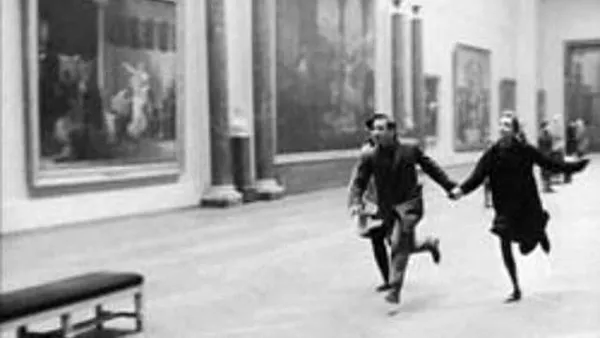Eye For Film >> Movies >> Bande À Part (1964) Film Review
Bande À Part
Reviewed by: Chris

Momentarily stuck for conversation, three characters in a cafe suggest a moment’s silence. “A minute’s silence can be very long,” says one. And, in almost Dali-esque fashion, “A real minute can last an eternity.” The actual minute, like Dali’s clock, melts into a mere 35 seconds. But Godard plays a joke on us by blotting out all the ambient noise, to great comic effect. What threatens to become profound simply becomes fun.
Amateur criminals Franz, Arthur and Odile plan to rob the house where the latter works as a maid. Godard, providing voiceover, gets us up to speed on the plot. But he takes a sideswipe at the “people who’ve come in late”.

Bande À Part has been described as ‘Godard-lite’ – it contains all of his quirky, Brechtian inventiveness, cinematic cleverness, obsession with ‘things that matter’ (such as sexual tension, intertextuality, youth and Paris) over mere details like narrative continuity. There are none of his political rants or philosophical digressions - just a rollicking good movie. In modern terms, it falls halfway between Woody Allen capers and Tarantino satire. And Tarantino famously named his Pulp Fiction production company after the film, as well using the dance sequence to inspire Travolta and Thurman.
Franz and Arthur are besotted with pulp culture. They act out gun battles where Billy the Kid is shot by Pat Garrett. It is part of their machismo bonding rather than any childish play. But it visually foreshadows the death of one of them. Posturing over plans for the robbery merges seamlessly with mutual desire for Odile, as if both were one and the same rite of passage. Odile, while going along with their conspiracy, often acts dumb and shy, pretending it’s not happening. Just like a shy young girl being seduced.
Many of the film’s references will be lost on the modern audience – these range from Rimbaud, Jack London, Edgar Allen Poe, and The Umbrellas Of Cherbourg, to Greek Theatre, Charlie Chaplin and Loopy the Wolf. But they are for fans and not necessary for our enjoyment. Witty dialogue (which seems remarkably intelligent for such urban cowboys) will delight almost any viewer, but especially the intelligent and ‘cultured’ classes’ from whence Godard came and yet which he constantly decries. Our hoodlums – reminiscent of the protagonist from À Bout De Souffle – are depicted here as completely amoral. We might excuse this more easily, given their distanciation and fairytale existence, were we not aware that Godard himself did time in jail for petty theft.
Insipid greyscales of riverbanks in the Paris outskirts are dramatised by colourful imagery, partly purloined from the original novel: “Under crystal skies, Arthur, Odile and Franz crossed bridges suspended over glassy rivers. The moats frozen. A taste of blood was in the air.” Arthur seduces Odile with sexy love notes, passed during an English class where the teacher expounds dramatically from Romeo And Juliet. All is larger than life. They drive an old banger but dream of racing at Indianapolis.
Techniques to prevent an audience from identifying with protagonists are often used to get us to think more deeply about what is happening. But Godard both uses the techniques and (rather patronisingly, if equally amusingly) also does the thinking for us. The three characters perform a dance routine – a badly executed but engaging Madison. This time, Godard cuts out the music (but not the ambient noise) periodically. Both to question, and then to tell us, what each of them thinks and feels. As the narrator is not one of the characters, and so seems to have no vested interest, this adds a documentary feel to the otherwise unreal proceedings (as John Hurt would do, many years later, in Dogville.) Is he poking fun at Hollywood musicals/crime thrillers? Or is it homage? More importantly though, it works. Bande À Part is continuously light and frothy, relishing its own resourcefulness and serving up a stream of delights.
But its strength is also its weakness. The story is too slight to be as memorable as the box of tricks for which it becomes the vehicle. Yet unlike, for instance, 2 Or 3 Things I Know About Her, it does not demand any depth of the viewer. This is about as mainstream as Godard gets. He could have, for instance, used the ‘one minute’s silence’ scene to underline our characters’ relationship to each other, an eternity that only they share. But, as he misses no opportunity to remind us, this is Godard’s story and his alone. The only relationship that interests him is with you, the viewer.
Reviewed on: 02 Jan 2009


















